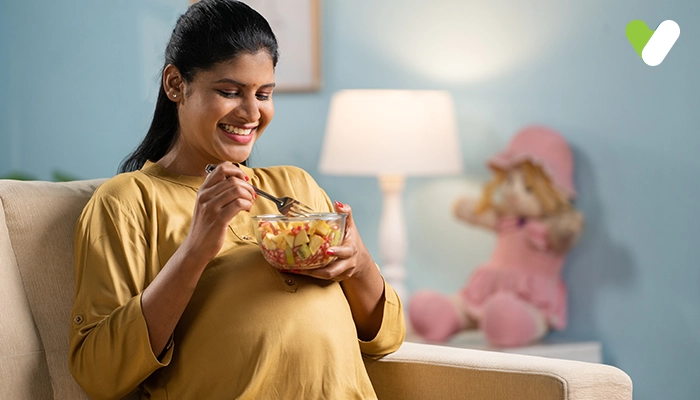Top 11 Ways to Stay Healthy During Pregnancy
- Eat healthy foods: It is extremely crucial for pregnant women to eat nutritious foods. In order to grow healthy and strong in the womb, your baby requires nutrition. Consume a variety of brightly coloured fruits and vegetables, whole grains, calcium-rich foods, and low-saturated-fat foods.
- Take a daily prenatal vitamin: Taking a daily prenatal multivitamin can help ensure that you and your baby get the correct amount of important nutrients during pregnancy. Folic acid, iron, and calcium are among them.
- Stay hydrated: The body of a pregnant woman requires more water than it did before the pregnancy. Aim for at least eight cups every day.
- Go to your prenatal care checkups: Women should see a doctor for prenatal care on a regular basis. Moms who don't obtain regular prenatal care are considerably more likely to have a kid who is underweight at birth or has other issues. Consider group prenatal care if it is available.
- Don’t drink alcohol: Avoid consuming alcohol before, during, and after pregnancy, as well as while breastfeeding. Having a baby with foetal alcohol spectrum disorder is more likely if you drink alcohol (FASD). FASD can result in facial abnormalities, severe learning impairments, and behavioural problems. Alcohol can have a negative impact on a baby's health even before a woman realises she is pregnant. As a result, women who may become pregnant should abstain from consuming alcohol.
- Don’t smoke: Tobacco use is harmful to both you and your unborn kid. Sudden infant death syndrome (SIDS), early birth, miscarriage, and other negative effects are all increased by it.
- Get moving: Staying healthy during pregnancy can be as simple as daily exercise or staying active in other ways. Consult your doctor to determine how much physical activity is appropriate for you.
- Get a flu shot: The flu can make a pregnant woman very unwell and raise her baby's risk of problems. The flu shot can help prevent you and your baby from serious illness after birth. Make an appointment with your doctor to obtain a flu vaccine.
- Get plenty of sleep: You and your kid both benefit from a good night's sleep (7 to 9 hours). To enhance blood flow, sleep on your left side.
- Reduce stress: Improving birth outcomes necessitates stress reduction. Stressful situations should be avoided as much as possible by pregnant women. Recruit your loved ones to assist you in coping with stress.
- Plan the right time to get pregnant: If you choose to become pregnant when you're at your healthiest, you'll have a better chance of having a successful pregnancy and birth.
Nutrition and Supplements Consumption During Pregnancy
It's always important to eat well, but it's extremely important when you're pregnant. As a result, make sure that your calories come from nutritional foods that will help your kid grow and develop.Maintain a well-balanced diet that includes the following dietary recommendations:
- Lean meats
- Fruits
- Vegetables
- Whole-grain bread
- Low-fat dairy products
However, taking prenatal vitamins does not imply that you may consume a nutrient-deficient diet. It's vital to remember that while pregnant, you still need to eat healthily. Prenatal vitamins are supposed to be a supplement to your diet, not your sole supply of essential nutrients.
Fluids to Consume During Pregnancy
During pregnancy, it is critical to consume plenty of fluids, particularly water. During pregnancy, a woman's blood volume expands considerably and drinking enough water each day might help her avoid common concerns like dehydration and constipation.Things to Avoid During Pregnancy
Alcohol: Alcohol can cause serious abnormalities in a developing foetus and is one of the most commonly recognised causes of mental and physical birth problems. Alcohol is easily passed on to the infant, who is less equipped than the mother to eliminate it. That implies an unborn kid is more likely to have a high level of alcohol in his or her system, which stays in the baby's system for longer than it would in the mother's. Moderate alcohol consumption, as well as binge drinking on occasion, can harm a baby's growing neurological system.Drugs: Pregnant women who take drugs may put their unborn children at risk for early birth, stunted growth, birth deformities, as well as behavioural and learning issues. And their children may be born addicted to the drugs as well. If you're pregnant and taking drugs, a health clinic like Planned Parenthood can refer you to health care experts who can help you quit and have a healthier pregnancy at a low or no cost. It's critical to tell your health care provider if you've taken any medications during your pregnancy. Even if you've stopped smoking, your unborn child may be at risk for health problems.


